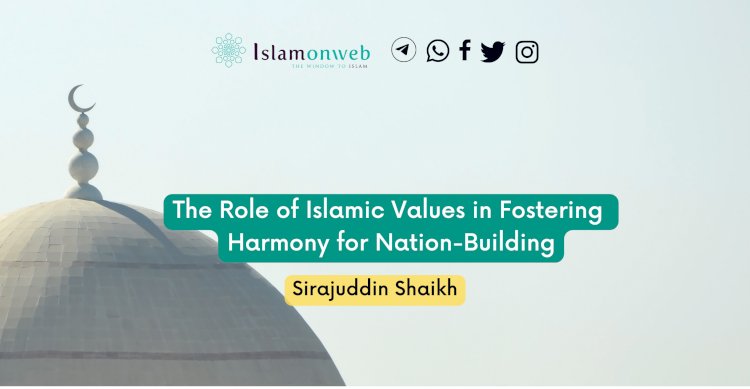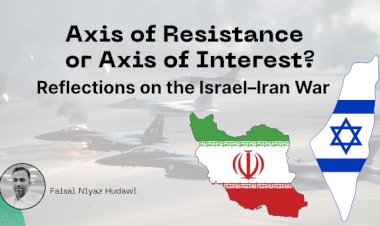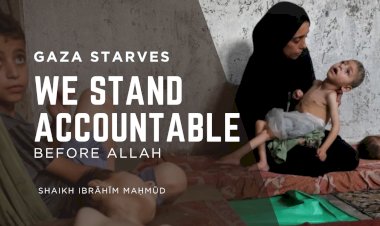The Role of Islamic Values in Fostering Harmony for Nation-Building
The concept of 'unity in diversity' is a foundational principle upon which the epic edifice of cultural pluralism and religious syncretism of a nation lies. This approach creates an environment where people of diverse communities can coexist harmoniously and foster stability and progress under the framework of varied religious and cultural practices. It is under the purview of this concept that citizens of different backgrounds accept their differences, appreciate their cultures and celebrate their festivals to lead the nation towards the common goal of integrity and prosperity.
Moreover, when religious practices and teachings advocate this concept of inclusivity, both religious and secular people entertain the cultural differences and similarities. As a result, the approach of this very concept becomes holistic and integrated. Islamic values too have encompassed a range of principles that emphasize compassion, justice, tolerance, and respect for others. These values have the potential to significantly contribute to fostering harmony among diverse communities within a nation.
Inclusivity in Islamic Teachings
In Islam, there are numerous values that foster the concept of inclusivity and create a strong foundation for people from different backgrounds to understand and respect each other. These principles guide Muslims to actively engage with others, seek commonalities, and address shared challenges. As Muslims embrace these values, they contribute to a harmonious environment where individuals from diverse backgrounds come together to experience inclusivity and togetherness. Well, as a matter of fact, these values come from the divine words of Allah the Almighty and the sacred teachings and dealings of the Messenger of Allah ﷺ. There are several occasions where Allah called out for inclusivity and diversity. In Surah Al-Ḥujrāt, for instance, He said: O mankind! We created you from a single (pair) of a male and a female, and made you into nations and tribes, that ye may know each other (not that ye may despise (each other). Verily the most honoured of you in the sight of Allah is (he who is) the most righteous of you. And Allah has full knowledge and is well acquainted (with all things).[i] This verse underscores the purpose of diversity as a means of recognizing and understanding one another. In another verse, Allah, emphasizing the intrinsic value of all human beings and the honor bestowed upon them, said: We have honoured the sons of Adam; provided them with transport on land and sea; given them for sustenance things good and pure; and conferred on them special favours, above a great part of our creation.[ii]
Not just that, these things could also be traced in the teachings of the Messenger of Allah ﷺ. Highlighting the mutual mercy, compassion and support of the believers, the Messenger ﷺ said: The similitude of believers in regard to mutual love, affection, fellow-feeling is that of one body; when any limb of it aches, the whole-body aches, because of sleeplessness and fever.[iii] This Hadith illustrates the interconnectedness of believers and their responsibility towards one another. Another example of inclusivity could also be found in the Pact of Medina[iv] signed in the year 622 CE, where the Messenger of Allah ﷺ established a treaty with various tribes and religious communities in Madina, ensuring the protection and equal rights of signatories, regardless of their background. There are several other examples in the Islamic history, such as acceptance of Bilal ibn Rabah rejecting the racial discrimination, tolerance of Fatḥ Makkah[v] dismissing the religious indifferences, and many others, which clearly showcase the true picture of Islam that it is more important to foster a sense of unity among people and promote harmonious coexistence with people of different backgrounds than to divide them in cultural, ethnic and social denominations.
Cultural Exchange and Brotherhood
Islamic values promote cultural exchange as a means of enhancing mutual understanding, appreciation, and cooperation among diverse communities. These values inspire different groups to work together without knowing or paying any attention to the culture or beliefs of the other groups. In Islam, the idea of "ummah" (community) highlights that believers should feel like they're part of a team and have a duty to help each other. This helps Muslims come together and join hands with other groups to make society better and inclusive.
There are several examples in our modern era where interfaith and intercultural initiatives have been taken. Let’s take ‘A Common Word’ initiative, where Muslim scholars and leaders sent an open letter titled "A Common Word Between Us and You" to Christian leaders worldwide. The letter highlighted the shared values of love, mutual understanding and cooperation between these two faiths, in line with the Quranic command, “O People of the Book![vi]”. This effort showed how people from different beliefs can talk and work together when they share similar ideas. With Jewish, there is the ‘Abraham Path Initiative (API), which promotes dialogue and cooperation between Muslims and Jews, drawing on the shared ancestry of Abraham. On a recent note, there established a ‘Muslim-Jewish Advisory Council’ (MJAC) in the United States, which brings together leaders from the Muslim and Jewish communities to address issues of common concern, promote cultural exchange and interfaith dialogue, and most importantly, to combat hatred and prejudices.
People from different communities gather together in interfaith and intercultural projects, guided by Islamic values. They build connections to understand and work with each other better. By working together on projects that promote understanding and teamwork, people from different communities connect and build strong relationships, guided by Islamic values. These examples showcase how Islam encourages cultural exchange, cooperation, and unity, contributing to the larger goal of fostering harmony and nation-building.
Islamic Contributions to Nation-Building
Now when it is clear from the holy scriptures and the cultures of Muslims that Islam is quite considerate about the concept of inclusivity and diversity, it would be worth looking at what sort of contributions has Islam put forth in order to meet the nation-building narrative in the modern socio-political and cultural environment. There are various aspects that Islam has influenced to contribute to the modern-geopolitical conditions of the world. Education and architecture are among the two major areas where Islamic contributions can be no-matter-what felt. In order to understand the rich history of scholarship and knowledge dissemination in the Islamic civilization, it would be enough to enumerate the establishment of centers of learning such as the Baith al-Ḥikmah[vii] (House of Wisdom) in Baghdad during the Islamic Golden Age, Al-Qarawiyyīin University established in the 9th century in Morocco, and Al-Azhar University, which laid the foundation for intellectual progress in the fields of mathematics, science, philosophy, medicine, and many more bringing in the concept of nation-building into reality.
Along with it, Islamic societies have been considered to be the masters of architecture and monuments for bringing in several eye-catching mosques, palaces, and public buildings. These places were not just for praying, they also brought people together, showed their culture, and helped cities grow. Some of the major examples of this architectural advancements are Great Mosque of Cordoba, Spain, the fort of Al-Ḥamrā, Granada, Sultan Ahmed Mosque[viii], Turkey, Hagia Sophia, Turkey, Masjid al-Ḥaram, Saudi Arabia and many more.
Not just this, there are several other factors in Islam which knowingly or unknowingly have given a lot more to shape a nation in a very resourceful manner. The theories that the modern world is talking about today such as social cohesion, youth empowerment, environmental stewardship (khilafah), ethical governance, conflict resolution, and economic justice can be referred to Islamic values and have always been there as a part of Islamic teachings and transactions. In case of ethical governance, for instance, the matters like adl (justice) muḥasabah (accountability), shūra (transparency) qānūn (law) maslaḥa (public welfare) ḥuqūq al-ibād (protection of rights) isrāf (corruption) and many more such matters are to be taken into account to ensure that the concept of ethical governance is in practice. The same goes with all the other concepts of the world. These Islamic values and historical examples imply that Islam has not only contributed to shape a resourceful nation, but also addressed the challenges that a nation would face to ensure the fair and neutral practice of among different communities.
Challenges and Opportunities
Even after being this much considerate of inclusivity, Islam has always been criticized not to be in line with modern-world politics. There are several challenges that Islam faces when it comes to build nations where people have varied backgrounds and it is never believed that Islam can bridge these gaps. One of the major criticisms comes due to the misrepresentation or misinterpretation of Islamic values. Jihād and Shari’a law compliance is what is mostly considered to be hindrances to foster harmony and collaboration, but hardly a few people would have read about these concepts and understood the matters from Islamic point of view. It is just that you are making assumptions with the cover of the book, not paying any extensive attention to what would the book carry in-between the lines. Another challenge that Islam faces is the rise of extremism and radicalization in the name of Islam which often obliterate the true values of the religion. Here too, negative narratives are brought in without referring to what the Islamic texts say about these things and to what extent does Islam have anything to do with these extremists or radicalists.
Overcoming these challenges, when someone sees Islam in a secular way he/she comes to know there are several opportunities that the world would have if they are ready to practice Islamic values or at least accept them. By doing so, the concepts of interfaith dialogue and community engagement would boost up and people would know that Islam is not against the world-view of diversity. In order to do so, media houses can play a significant role to draw the true picture of Islamic values contributing harmony and unity among different communities. The initiative could also be taken from Muslims’ part by advocating policies and promoting inclusivity, diversity, and social justice, aligning with the principles of Islamic teachings.
Islamic Nations Practicing Inclusivity
There are several nations where Islamic values have positively influenced diverse communities, cross-culturalism, ethnic inclusiveness, and pluralistic viewpoints. In these countries, Islamic values have been fostering unity and harmony among people of different backgrounds. In Indonesia, as the world’s largest Muslim-majority country, people of various ethnicities and religions coexist harmoniously. The principle of "Bhinneka Tunggal Ika" (Unity in Diversity) is deeply rooted in the country's culture, influenced by Islamic values of acceptance and mutual respect. In Malaysia, the commitment to inclusivity can be reflected in its concept of ‘1Malaysia’, which encourages unity among diverse communities. The United Arab Emirates, promoting interfaith harmony and cultural differences, declared the year 2019 as ‘Year of Tolerance’, which highlights the importance of Islamic values in fostering understanding and respect among different communities within the country/emirates.
Apart from Muslim countries, there are several other communities within a country, who have promoted the concept of diversity for the people of different ethnicity, race, or creed. In Toronto, Canada, for instance, there is an initiative called ‘Visit a/my Mosque’ which is envisioned to open the religious worship places of Muslims for the people of all backgrounds, encouraging people to increase the values of diversity enshrined in the Islamic values. These examples of nations and communities promoting the concept of inclusivity under the prism of Islamic values demonstrate how impactfully Islam has an effect on the concepts of fostering communal harmony and nation-building.
Conclusion Note
Exploring Islamic values in the context of 'Unity in Diversity' helps create peace and togetherness while building a nation. These values, like being kind, accepting others, and being fair, go beyond different cultures and religions. They show us a meaningful way to make a society that includes everyone. Furthermore, real-life examples show how Islamic values bring different societies together and bridge social, political and cultural gaps among communities.
Looking ahead, we should explore how Islamic beliefs can create a just and calm society. By embracing these beliefs, countries can share a tale that unites people and honors our unique differences. As our world becomes more complex, the opportunity of using Islamic lessons to build a lasting heritage of unity, empathy, and cooperation for a bright tomorrow increases and it would be the right time to take advantage of the values to ensure harmony and nation-building, aligning with the principles of Islamic teachings.
References
Afsaruddin, Asma, 'The Concept of Harmony in Islamic Thought and Practice', in Chenyang Li, and Dasha Düring (eds), The Virtue of Harmony (New York, 2022; online edn, Oxford Academic, 24 Mar. 2022), https://doi.org/10.1093/oso/9780197598481.003.0008, accessed 10 Aug. 2023.
Jamilah, Sitti. 2021. “Moderate Islamic Education to Enhance Nationalism among Indonesian Islamic Student Organizations in the Era of Society 5.0.” Journal of Social Studies Education Research, (12), 79-100. https://files.eric.ed.gov/fulltext/EJ1318796.pdf.
Tahir, Muhammad, and Dr. Samiullah Zubairi. 2017. “Towards the Role of Islamic Education in Promoting Peace and Harmony in a Society: An Analysis.” SSRN Electronic Journal, (January), 25-36. file:///C:/Users/SPC-10/Downloads/04_25-36_TowardstheRoleofIslamicEducationinPromotingPeaceandHarmonyinaSocietyAnAnalysis.pdf.
Alam, Mansur. 2016. “Harmony in Religious and Cultural Diversity: Case Study of Sungai Penuh City Society.” 05, no. 2 (December): 265-280. https://core.ac.uk/download/pdf/236211642.pdf.
Rahman, Fida-Ur. 2018. “Role of Islam in Global Peace-Building and Harmony: An Analysis of Pacts of Madina and Hudaibiya.” Abḥāth 03, no. 10 (June): 49-64. file:///C:/Users/SPC-10/Downloads/RoleofIslaminGlobalPeace-BuildingandHarmony.AnAnalysisofPactsofMadinaandHudaibiya.pdf.
Miller, Leon L., and Gordon Anderson. 2009. “Religion's Role In Creating National Unity.” World Peace 26, no. 01 (March): 91-138. https://www.jstor.org/stable/20752875.
Khambali, Khadijah M., Alwani Ghazali, and Nurhanisah Senin. n.d. “Fundamental Elements In Sustaining Inter-Religious Harmonious Relations Under Islamic Perspectives In The Age Of New Media.” Journal of Nusantara Studies 07 (02): 147-165. Accessed August 10, 2023. file:///C:/Users/SPC-10/Downloads/709-Article%20Text-1956-1-10-20220630.pdf.
Nasr, Seyyed. (2010). “A Common Word” Initiative: Theoria and Praxis. 10.1057/9780230114401_3.
Marchildon, Jackie. 2018. “Muslims Invite Other Canadians to 'Visit My Mosque' and Open Dialogue.” Global Citizen. https://www.globalcitizen.org/en/content/visit-my-mosque/.
SanPietro, Lara. n.d. “What is the Abraham Path Initiative? - PON.” Program on Negotiation at Harvard Law School. Accessed August 10, 2023. https://www.pon.harvard.edu/tag/abraham-path-initiative/.
Princeton Hillel. n.d. “Students Learn About AJC Muslim-Jewish Advisory Council.” Princeton Hillel. Accessed August 10, 2023. https://hillel.princeton.edu/blog/students-learn-about-ajc-muslim-jewish-advisory-council.
Mohammad, Shaikh. 2018. “UAE to celebrate 2019 as the 'Year of Tolerance.'” Gulf News. https://gulfnews.com/uae/government/uae-to-celebrate-2019-as-the-year-of-tolerance-1.1544862554623.
Endnotes
[i] Holy Quran: 49/13
[ii] Holy Quran: 17/70
[iii] Sahih Muslim 2586a, b.45, h.84
[iv] Also known as ‘Constitution of Medina’ or The Medina CHarter
[v] The conquest of Makkah took place in the 8th year of Hijri in the month of Ramadān.
[vi] Holy Quran: 03/64-65 & 70-71
[vii] The Grand Library of Baghdad build by Al-Ma’mun and Harun al-Rashīd during the Abbasid caliphate.
[viii] Also known as ‘The Blue Mosque’
About the author
Sirajuddin Shaikh is a PG research scholar of the Department of Study of Religion at Darul Huda Islamic University, Kerala, India. His research areas include Islamic Studies, Study of human behavior, and Islamic psychology
Disclaimer
The views expressed in this article are the author’s own and do not necessarily mirror Islamonweb’s editorial stance.
























Leave A Comment